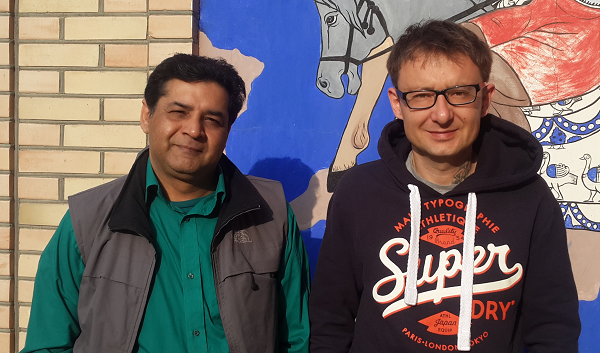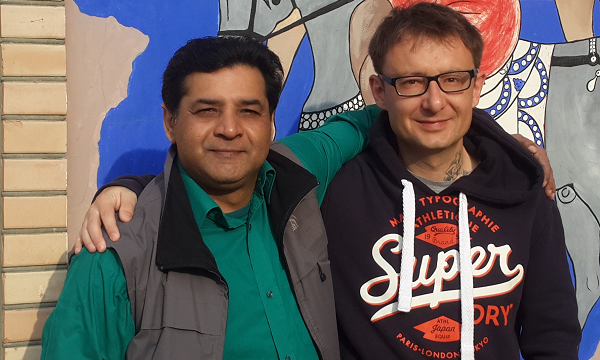“Polish tourist in Soviet Union”—An Interview with Juliusz Strachota

By Agha Iqrar Haroon
He is a thin man with a louder voice. He is candid, simple and out spoken. He is not shy to tell you that he had been on drugs for a long time and even first phase of rehabilitation did not work on him.
He can tell you with honesty how much drug abuse was disastrous for his family life and how did his wife left him alone though she loved him very much but could not bear and stand with him. He tells you how a man is left alone once he enters the world of drugs. He has left drugs and today he neither drinks alcohol nor he smokes and barely imprints of drug abuse left on his body are tattoos he carved during the phase of drug abuse.
He is expressive because he is a writer and he is not a mere unknown writer indeed. He is Juliusz Strachota—one of the best novelists and short story writers of Poland.
He is nostalgic about past and breakup of former Soviet Union left strong impressions on his personality and memories. “Everything was change abruptly. My neighbourhood was not same—my school was not same. It was total and abrupt disintegration from Yesterday for entering Today. It was sudden and unexpected for a young boy of 10 year of age. It was too much for me”, said Juliusz Strachota when I asked him about his memories with reference to impact of USSR disintegration over Polish society.
Born on 20 April 1979, he is author of 6 collections of short stories including bestsellers like “Dream worth having cigarettes” and “Shadow of the block Miron Białoszewski” (English titles of his Polish short stories). He belongs to a family of writers and journalists. His father was also a journalist before his retirement. His stories and reports are published in different top newspapers of Poland including “Lampa”, “Time of Culture”, “Politics” and “Gazeta Wyborcza”.
Our meeting was an interesting “happening”. He was staying in the same hotel in Samarkand where I was staying during my last visit to Uzbekistan. I did not know him though we had been meeting in breakfast hall for the last four days before the night we started knowing each other personally. He was introduced to me by the manager of the hotel because manager knew I am a travel writer and I am very keen to meet people of different social backgrounds. Our first meeting was very brief and he introduced himself and informed me he was a writer who was finishing another novel during his stay in Samarkand. It was a pleasant surprise for me when I googled his name next morning—Oh, he is an authentic popular Polish writer. When I came back to hotel, I found him sitting in lobby and I offered him coffee. Actually it was our first real meeting and we discussed cultures, literature, history, philosophy, photography and tourism. He was a student of cultural studies at the University of Warsaw and photography at the Film School in Lodz. I requested him for an interview and he instantly honoured my request. Our meeting and his interview lasted till mid night and ended with a wonderful personal interaction I ever had with a writer before because popular and successful writers are mostly introvert or unimpressive personalities.
He is well-published Polish writer and his over 120 short stories had been published in 1,000 plus newspapers and magazines of Poland.
Juliusz Strachota is considered by critics as a late heir of Białoszewski who has a cult status among Polish writers. He was a creator of a whole tradition in Polish literature and Juliusz, is his new continuator and a great fan of him. He told me that his typical hero (character) is a lonely person and struggling against demon and finding help from people from the “other world” —the world we cannot see but we can feel if we believe in this other world. He said he was obsessed with Saska Kepa in Warsaw, where Bialoszewski lived.
His work has a fine blending of metaphysical aspects and mostly his characters have a spiritual link with the worlds beyond sensations—the other worlds—the hidden worlds and it could be a reason for his drug abuse because he wanted to experience these worlds beyond our real world. His characters take guidance from dead people because he strongly believes that there is a connection between the dead and the alive. He says he writes in a trance and then leaves the short story and novel for some days before staring reading and editing.

He honestly accepts that his work is influenced by many classic Polish writers while his critiques believe he is a combination of Etgar Keret, Raymond Carver and Bialoszewski.
I asked him why he had been travelling into Uzbekistan? In response to my question, he narrated a fascinating aspect of his childhood. He said that he found a black and white book in the library of his father that was about experiences of a Polish traveler of Soviet Union era and this small book fascinated him whole of his life.
“I was 10 or 11 year old when I found a black and white travelogue without photos and even its printing was very bad and the title of that travelogue was “Polish tourist in Soviet Union”. This travelogue was all about journeys of a writer to different cities of former Soviet Union including Kiev, Moscow, Tbilisi, Baku, Samarkand and Dushanbe. Since then, I wished to see all these cities because I was so fascinated by stories I read about these cities that I had been travelling in my dreams to these spots. Now only Dushanbe is left and I have seen all of these wonderful destinations”, he concluded.
Sometimes my friends and colleagues ask me why I am so keen to travel and write travelogues since the last 25 years though my journalistic career is known for my social and political reporting and interviews of top political personalities. Now I have a clear answer for my friends after meeting Strachota. My answer is simple and clear —“There is a possibility that my travelogues may fascinate youth like Strachota was fascinated and this fascination may lure young people and forthcoming generations to travel and see destinations I have been writing about”.
I strongly believe that travel and tourism is the foremost and the most successful tools for developing interfaith harmony, peace, tolerance and psychology of co-existence among cultures, societies and countries and all these components are the “Must” for developing a better future for generations to come.
